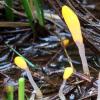
16-02-2026 11:53
Joeri Belisbetween leaf litter on twig in young salix growth.

16-02-2026 11:43
Joeri Belisbetween leaf litter on twig in young salix growth.

14-02-2026 22:45
Hy!I would ask for some help determing this specie

13-02-2026 03:30
Hello! I found these immersed perithecia on a stic

14-02-2026 10:58
 Bernard CLESSE
Bernard CLESSE
Bonjour à toutes et tous,Pourriez-vous m'aider à

13-02-2026 18:05
Margot en Geert VullingsOn February 9, 2026, we found these small hairy di

02-02-2026 21:46
Margot en Geert VullingsOn a barkless poplar branch, we found hairy discs

15-02-2026 04:32
One more specimen that is giving me some descent a
Mitrula paludosa
Yannick Mourgues,
13-06-2008 22:20
 Bonsoir.
Bonsoir.Aujourd'hui, découverte d'une magnifique station de Mitrula paludosa. Plusieurs centaines d'exemplaires.
Je me demandais si c'était courant comme espèce. J'ai cru voir qque part que c'est une espèce protégée dans certaines régions. Est-ce vrai ?
Yannick
Yannick Mourgues,
13-06-2008 22:23

Re:Mitrula paludosa
Good evening.
Today, I have found a nice place with more then one hundred specimen of Mitrula paludosa.
I would like to know if it's common or rare ? I think I have seen somewhere that this specie is protected in many countries. Is it right or not ?
Yannick
Today, I have found a nice place with more then one hundred specimen of Mitrula paludosa.
I would like to know if it's common or rare ? I think I have seen somewhere that this specie is protected in many countries. Is it right or not ?
Yannick
Andrew N. Miller,
13-06-2008 22:33

Re:Mitrula paludosa
We have recently (May 2008) collected this species from the Great Smoky Mountains National Park in North Carolina, USA. It had a fascinating habitiat - growing only on dead leaves in a stream. It has previously been collected from this park before. I may not have the correct species, but I believe it is a Mitrula. It does look very similat to your specimen.
Andy
Andy
Stip Helleman,
13-06-2008 22:46

Re:Mitrula paludosa
Hi Yannick,
This species is on the Netherlands red list as endangered species but has no legal protection status, none fungi have in the netherlands. You should ask Regis he is amember of the European Council of Conservation of Fungi. (hypelink to the ECCF) http://www.wsl.ch/eccf/
Amitiés
Stip
This species is on the Netherlands red list as endangered species but has no legal protection status, none fungi have in the netherlands. You should ask Regis he is amember of the European Council of Conservation of Fungi. (hypelink to the ECCF) http://www.wsl.ch/eccf/
Amitiés
Stip
Andreas Gminder,
13-06-2008 22:53

Re:Mitrula paludosa
Hallo,
Mitrula paludosa grows on litter in very wet places. Sometimes even in the water, but not truly submerged. Main biotops in Germany are either the borders of peat bogs, especially when there are channels to drain them and on the other hand Alnus swamps which go along small rivulets or which surround lakes or other biotops with standing water. Itz occurs on litter of conifers as well as on broadleaf litter. In Germany it has a clear preference for acid soils and for nutriant poor water. Therefor it is quite common in the areas with acid ground, but is lacking nearly totally in the lime stone areas.
Last year I have also observed a group of three albinotic ascocarps - purely white - amongst hundreds of normal coloured exemplaires.
In the german Red List of 1992 the species was classified as category 3, which means "vulnerable" and is the lowest category in the Red List. In the new version Mitrula paludosa will fall out of the Red List and is classified in a category outside hte List which means something like "not yet endangered, but its situation needs tol be observed".
best regards,
Andreas
Mitrula paludosa grows on litter in very wet places. Sometimes even in the water, but not truly submerged. Main biotops in Germany are either the borders of peat bogs, especially when there are channels to drain them and on the other hand Alnus swamps which go along small rivulets or which surround lakes or other biotops with standing water. Itz occurs on litter of conifers as well as on broadleaf litter. In Germany it has a clear preference for acid soils and for nutriant poor water. Therefor it is quite common in the areas with acid ground, but is lacking nearly totally in the lime stone areas.
Last year I have also observed a group of three albinotic ascocarps - purely white - amongst hundreds of normal coloured exemplaires.
In the german Red List of 1992 the species was classified as category 3, which means "vulnerable" and is the lowest category in the Red List. In the new version Mitrula paludosa will fall out of the Red List and is classified in a category outside hte List which means something like "not yet endangered, but its situation needs tol be observed".
best regards,
Andreas
Jean Pierre Dechaume,
13-06-2008 23:00

Re:Mitrula paludosa
Pour donner un avis limité à ma région, le sud du Morvan, (Saône et Loire, France), c'est une espèce courante et très abondante, tous les ans, dans les milieux qui lui conviennent, les dépressions tourbeuses acides avec sources et ruisseaux, de 400 à 800 m d'altitude.
J Pierre
J Pierre
Enrique Rubio,
14-06-2008 08:22
Re:Mitrula paludosa
In Spain it's a very common species, with restricted habitat, from 500 to 2000 m of altitude


